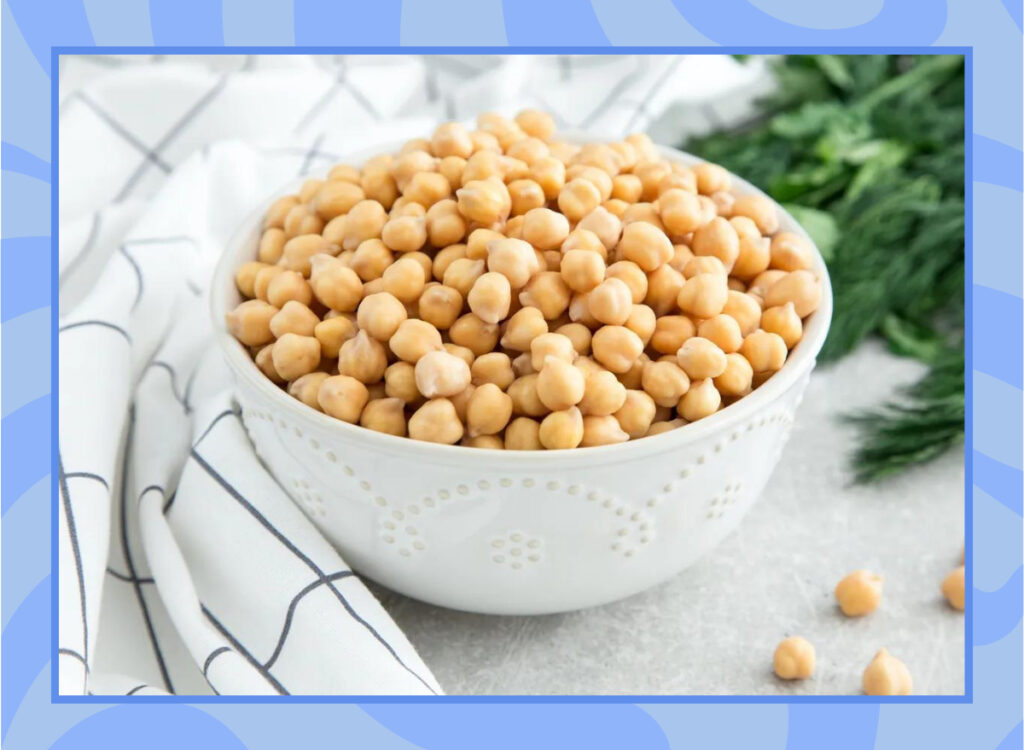If you’re a vegetarian or try to eat mostly plant-based foods, you’re probably familiar with chickpeas. This protein-rich legume is a member of the bean family and is a tasty component of hummus, falafel, salads, and plant-based sandwich recipes. They’re flavorful, easy to use, convenient when canned, and affordable, making them a popular choice in many parts of the world. There are many benefits to eating this legume, but when it comes to nutrition, are chickpeas really good for you?
The short answer is yes, for most people, chickpeas can be a nutritious addition to a balanced diet. In this article, we explore the benefits and potential side effects of eating chickpeas.
Chickpea Nutrition
In just one cup, chickpeas provide your body with nearly 15 grams of protein, over 12 grams of fiber, 4 grams of fat, and only 270 calories. In short, they are an endless source of nutrients. According to USDA Food Data CenterOne cup of cooked chickpeas contains:
Nutrition (per cup, cooked):
Calories: 269
Fat: 4 g (saturated fat: < 1 g)
Sodium: 11.5 mg
Crabs: 45 g (Fibre: 12.5 g, Sugar: 8 g)
Protein: 14.5 g
Read on to learn more about the benefits of eating chickpeas and some possible side effects. Then, check out the 15 best high-fiber recipes for weight loss.
5 Benefits of Eating Chickpeas

They help with digestion.
Fiber is an essential part of digestion, Yet some people struggle to get enough of them each day. Fortunately, chickpeas rank among the best in this category, especially with a high dose of soluble fiber called raffinose. This helps you digest your food more slowly as the good bacteria break down the raffinose. Plus, according to a study on chickpeas published in Nutrientsstools may be more comfortable and more frequent.
They can keep you full.
One cup of cooked chickpeas contains 12.5 grams of fiber and 14.5 grams of protein, two nutrients that can work together to keep you feeling full and satisfied after eating.
To start, your body takes longer to digest protein than other nutrients, which helps you feel fuller for longer. Protein can also help reduce hunger hormoneswhich helps reduce your appetite. Fiber may have similar effects on your hunger levels and helps regulate your appetite by also increasing satiety.
Chickpeas can help lower cholesterol.
For optimal vitality and energy, it is essential to manage your cholesterol levels. Why? High cholesterol level may contribute to heart disease, obesity, stroke, and other serious diseases. Chickpeas are high in fiber and high fiber foods may help lower cholesterol levels and help prevent cardiovascular disease.
They may reduce your risk of cancer.
Our body is an amazing machine, capable of fighting off diseases, creating organs during pregnancy, and protecting us from viruses, environmental factors, and more. When we feed our bodies nutrient-dense foods like chickpeas, it’s like we’re giving ourselves a helping hand.
In fact, when we consume chickpeas, our body produces butyrate, a short-chain fatty acid. A study published in Cancer Journal shows that this fatty acid can fight diseased and/or dying cells. Another study goes even further and claims that it could reduce our overall risk of colorectal cancer.
They give you stronger bones.
Chickpeas Legumes are rich in fiber, magnesium and calcium, like many other legumes. They have many benefits for our body, but one of the most important is to strengthen and strengthen bones.
According to a study published in NutrientsWe need adequate calcium for the development and maintenance of healthy bones, and one cup of chickpeas can provide about 6% of that calcium. daily value.
A study of the journal Bone found that magnesium can help prevent bone loss. The good news is that one cup of chickpeas can provide 18% of your daily value.
2 Possible Risks of Eating Chickpeas


You risk overeating calories and fats.
Chickpeas are healthy, so you can eat as many as you want, right? That’s not always the case. While they’re a source of protein, fiber, and many helpful nutrients, they can also be turned into snacks and meals that quickly rack up calories and fat. Here are two examples: Hummus And Falafelboth of which should be consumed in moderation as they can be high in calories and fat.
Botulism is a remote possibility.
Although the risk The risk of contracting botulism from canned goods is very low, it is still present, according to the CDCBotulism is common when a person cans foods at home and the canning process is not done properly. correctly. This serious illness is rare and is caused by bacteria that disrupt the nervous system. Sometimes, depending on the USDAWhen canned foods are not stored properly, this bacteria can grow, especially in solutions low in salt, oxygen and sugar, such as chickpeas.
#Chickpeas #Good #Effects #Eating




